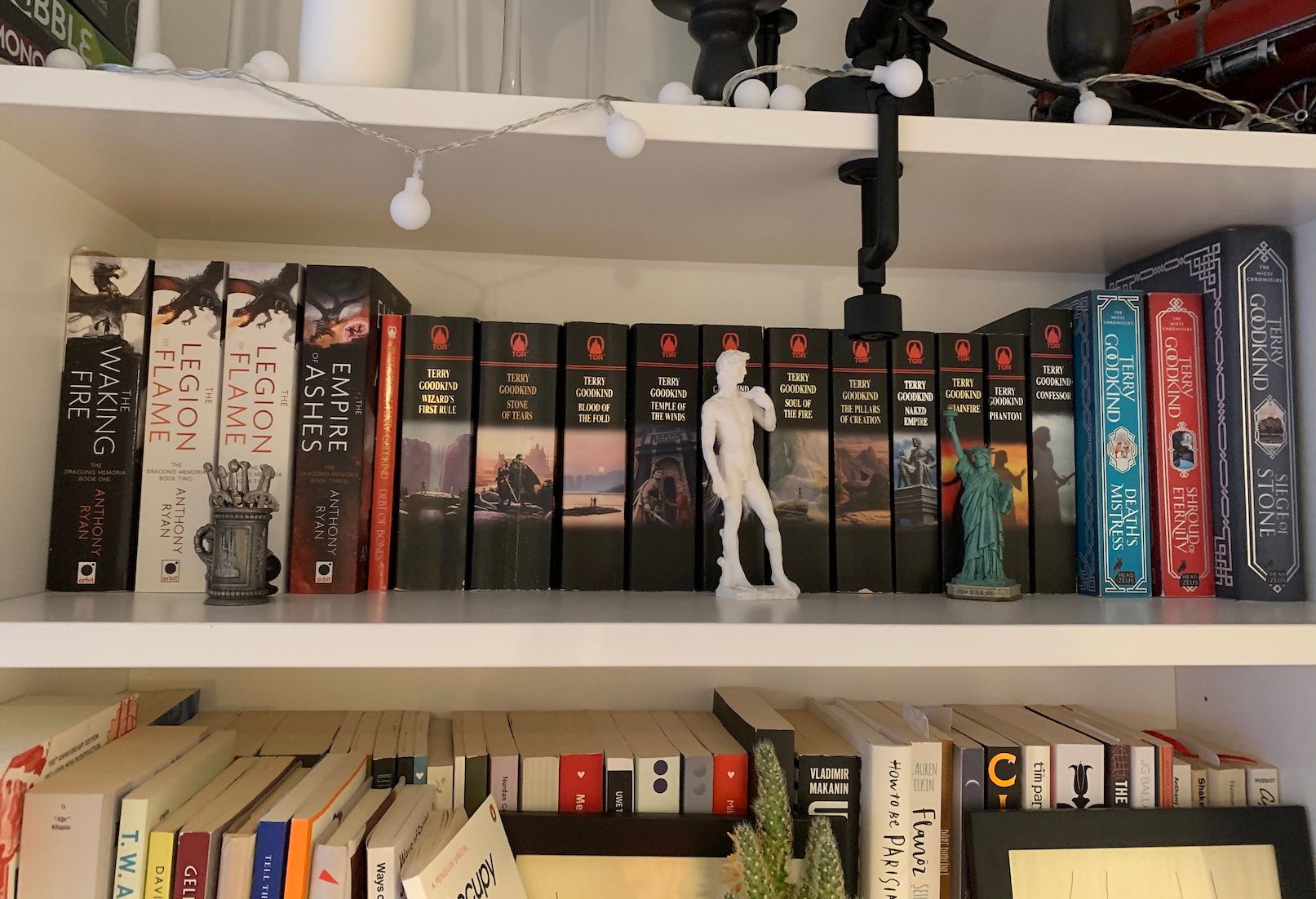Wizard's First Rule

The Wizard's First Rule is my favourite book. I mean, not one of my favourites, the favourite book. It's one of the first books I read in fantasy fiction, along with Eragon and other books in The Inheritance Cycle, by Christopher Paolini. I either skim through Wizard's First Rule or re-read it every year. Even opening up a random page, I can't drop the book without finishing the scene. The way he describes Richard's first kill, the pain that sword extracts, his fear for Kahlan, they are all amazing work of art even on their own. The crown jewel of the entire book is where Richard falls into the hands of Mord-Sith and he gets tortured by Denna for 80 pages straight. That scene, for me, is a masterpiece.

I've read the entire Sword of Truth series, including the first 11 books (Wizard's First Rule to Confessor) as well as The Omen Machine, The Third Kingdom, Severed Souls and Warheart. 15 book long series, spent hundreds if not thousands of hours reading them. I've learned many things from that series, especially the Wizard's Rules are exceptionally accurate in real life. Let's recap them first:
- People are stupid. They believe things mainly because they either want them to be true or fear them to be true. (Wizard's First Rule)
- Harm can result from good intention. (Stone of Tears)
- Passion rules reason. (Blood of the Fold)
- There is Magic in sincere Forgiveness, both in forgiveness received and given. (Temple of the Winds)
- Mind people's actions over words. (Soul of the Fire)
- Only allow reason to rule you. (Faith of the Fallen)
- Life is the future not the past. (Pillars of Creation)
- Talga Vassternich / Deserve victory. (Naked Empire)
- Contradictions cannot exist. (Chainfire)
- Ignoring truth is betraying yourself. (Phantom)
- Embrace life, Strength without hate. (Confessor)
Each are of course worked into intricate stories in each book, but even on their own they are quite a collection of wisdom. One of them, the first rule, proved itself relevant and accurate repeatedly over the years, almost every day:
People are stupid. They believe things mainly because they either want them to be true or fear them to be true.
I've seen people in my home country repeatedly fall into the same erroneous belief when it comes to the government: They either feared they would be wrong or they were so desperate, they wanted it to be true. Of course, they've been put into that position by the very same people, but nevertheless, it doesn't change the stance.
Even lately, with the COVID-19 pandemic, it's still the viable: People are still out disregarding government's advice because they are afraid that it might be true and it would mean fearful days or even weeks for them. So, they play deaf and still do whatever they do, which is partying. The stupidity here is monumental, it's so visible and real, you can cut it with a knife.
I've read many other fiction books but I've never seen one that tells a theme this clear. The book has its issues, don't get me wrong, but it has many good details that are based on our own reality. Goodkind etched his wisdom into his books expertly.
The storytelling in the book is particularly good. Even though it lacks the fancy vocabulary, it has quite a good beat. The exposition of the surroundings, especially the Westland forest, is spectacular. Characters are not paper-thin, they are actually quite deep. He's showing you the world, not telling you how it is. Once you learn the feeling of Richard putting his hand through is hair, you don't need Goodkind to tell you that he's feeling anxious or overwhelmed every time he does it. You get to know the characters, you live them.
The plot twist, where Richard plays a gamble and deceives Darken Rahl into opening the wrong Box of Orden, is also quite imaginative. The entire idea is based on Richard's love, where he believes his heart is so full with Kahlan, her magic won't be able to hurt or take over him. It's not a blind bet, he's far more intelligent to do something reckless. In his heart, he loves Kahlan to the full extent. He knows he'll be fine, and makes his bet accordingly. He's right to do so, what else he could do?
And the masterpiece part of the book: The torture of Mord-Sith. When Richard is captured by Denna, he is tortured heavily. He's tortured using Mord-Sith magic, with that even his thoughts are against him. But he pulls an amazing trick: He locks his being into a box and stores it away in his mind. That lets him to strip himself off of his pride, his values, his self and endure. He does whatever is necessary to survive, even if that means endless pain. I don't know where Goodkind got the idea for this part, but it's not just imaginative, it's described with good detail. You can almost say he's speaking from experience.
Anyway, I wanted to pen down my thoughts about the book, the series and Goodkind because of my next post: How his books took a nosedive and lost its charm. I'll be talking about it in detail, but I wanted to pay him my long due respect.
The book will continue to be my favourite, but I'll stop reading the new ones. I need to keep what I have: My feelings, my memories and my love.

